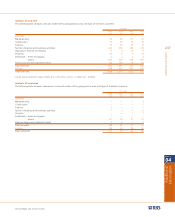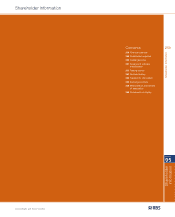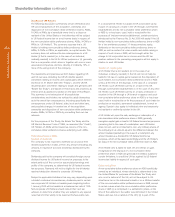RBS 2005 Annual Report Download - page 257
Download and view the complete annual report
Please find page 257 of the 2005 RBS annual report below. You can navigate through the pages in the report by either clicking on the pages listed below, or by using the keyword search tool below to find specific information within the annual report.
section
04
Additional
information
255
Additional information
Annual Report and Accounts 2005
Firms must also meet standards relating to senior
management and internal systems and controls and must
comply with rules designed to reduce the scope for firms
to be used for money laundering. Revised Joint Money
Laundering Steering Group Guidance Notes will come into
force approximately mid 2006. The EU has published its
draft Third Money Laundering Directive which will
supersede the two previous Anti Money Laundering
Directives. Implementation is expected in 2007.
Conduct of business standards essentially govern key
aspects of firms’ relationships with customers, and require
the provision of clear and adequate information, the
managing of conflicts of interest and the recommending of
products suitable to the needs of customers. The
marketing of financial products (particularly investment
products) is subject to detailed requirements.
1.4 Focus on customers
An important element in securing an appropriate degree of
consumer protection is ensuring that suitable
arrangements are made for dealing with customer
complaints. Firms are required to establish appropriate
internal complaint handling procedures and to report
complaints statistics to the FSA. Where an issue cannot be
resolved by the parties it may be referred for independent
assessment to the Financial Ombudsman Service.
The FSA’s high level principles require all regulated firms to
treat their customers fairly. The FSA has undertaken a
number of industry wide thematic reviews on this issue, and
this is expected to continue in 2006. The FSA has indicated
that it will include assessment of firms' effectiveness in this
area in regular risk assessments of firms.
The Financial Services Compensation Scheme (financed
by levies on authorised firms) is available to provide
compensation up to certain limits if a firm collapses owing
money to investors, depositors or policyholders.
1.5 Fraud
Towards the end of October 2004, the FSA launched its
new policy on combating fraud in the financial services
industry – Fighting Fraud in Partnership. The FSA is working
on a programme of activities focusing on (i) actions that the
FSA will take, (ii) FSA support for work by trade
associations and the industry, (iii) creating closer
relationships with law enforcement agencies and, (iv) the
Government making fraud a higher law enforcement priority
and leading the development of a fraud strategy. On 26
October 2005, the Attorney General announced that the
Government will carry out a wide ranging review of fraud to
consider the scale and costs to the country of fraud. The
final report is to be produced by late spring 2006.
1.6 Enforcement
Where appropriate, the FSA may discipline and/or
prosecute for breaches of the legislative or regulatory
requirements. The FSA works closely with the criminal
authorities and uses both civil and criminal powers. It can
withdraw a firm’s authorisation, discipline firms and
individuals, prosecute for various offences and require
funds to be returned to customers.
The FSA also has powers under certain consumer
legislation to take action against authorised firms to
address unfair terms in financial services consumer
contracts.
1.7 Extension of the FSA’s responsibilities
From 31 October 2004, the scope of the FSA’s
responsibilities was widened to cover the regulation and
supervision of mortgage lending and administration and
the provision of mortgage advice. Arrangements relating to
the sale and administration of general insurance (and
certain other insurance) contracts became regulated from
14 January 2005.
1.8 Other relevant UK agencies and Government departments
Consumer credit issues are covered by the Department of
Trade and Industry (“DTI”) and the Office of Fair Trading
(“OFT”) and competition issues are dealt with by the OFT.
Changes to consumer credit regulation are being
promulgated at both national and EU levels. A number of
changes to the UK regime took effect in May 2005, and the
Consumer Credit Bill, once enacted in 2006, will make
further, more fundamental, changes. Negotiations also
continue on a draft EU Consumer Credit Directive, to
harmonise core regulatory standards in each EU Member
State. The UK regime will need to change again when this
Directive is implemented in 2008 or later.
1.9 The European dimension
Much of the regulatory agenda in the UK and other
European Member States in which the Group operates
continues to be set by the European Union. Legislation
comprising the Union’s Financial Services Action Plan is
nearly complete and implemented, with attention now
turning to the policy agenda through to 2010. The
Commission wishes to pursue a different approach to
policymaking: costed, evidence-based and targeted.
Nonetheless, there are some major initiatives already in the
pipeline; including a revised Consumer Credit Directive, a
directive to establish a Legal Framework for the Euro
Payments Area, Solvency II (a revised EU capital
framework for insurance companies), and possible
legislation on mortgage credit. In addition, the Capital
Requirements Directive and Markets in Financial
Instruments Directive, both of which apply to the Group are
expected to be implemented in the next two years. The
Group has been increasingly engaged with EU and
national policymakers on all these priority measures, and
will aim to maintain this level of involvement.
























